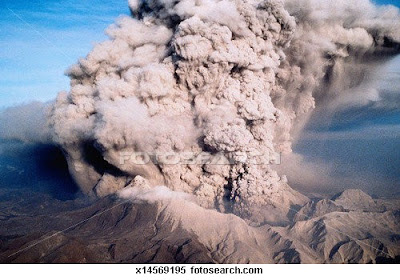ABC of Weather: Volcano

When Iceland's Eyjafjallajokull volcano erupted in April, our first concern was the unprecedented disruption to air traffic over the UK and other parts of Europe. However, it wasn't long before questions were being asked whether the ash fallout such as the thin layer I still have on my car would affect our soils (unlikely here, but in Iceland...???) or on our weather over the coming months. Whilst volcanic eruptions can and do affect both weather and climate, this particular one appears to have had a negligible effect thus far.
From what I can glean from the internet, there are a number of reasons why this is so. Whilst the pictures we saw of the eruption were dramatic, they simply weren't forceful or long enough. Nor were they sufficient in volume to send the amount of dust into the upper reaches of our atmosphere needed to have a significant cooling effect caused by the dust particles reflecting back the sun's rays. Neither is the volcano spewing out sufficient gases such as carbon dioxide to have even a short term impact on our weather (never mind climate change), nor are there enough sulphur compounds in the eruption to have an effect on the acidity of our rainfall. Phew. It was probably different in Iceland as eruptions like these often result in localised thunder, lightning and rainfall.
The last eruption I've found which did have a noticeable effect on our global weather was in 1991 when the pictured Mount Pinatubo erupted (photo courtesy of Fotosearch). It's estimated the summer that year was 0.9 degrees centigrade cooler. Other notable eruptions were Indonesia's Tambora in 1815 which resulted in the 'year without a summer' in 1816: New England experienced frosts throughout the summer months (see here for lots more information and references about weather changing volcanic eruptions). The most dramatic eruption ever was probably Toba around 70,000 years ago which is thought to have resulted in a 6-10 year volcanic winter which dramatically reduced the world's human population to around 10% of its previous level and may have had a cooling effect for as long as 1,000 years.
How's the weather with you today? Here there's not a cloud in the sky: it's warm and sunny but with a stiff breeze. The perfect weather for a brisk walk around Dyrham Park this morning with friends followed by a pub lunch sat outdoors :)
Doooo Visit the ABC Wednesday blog for more in the way of V...










There have been several items of news lately for volcanoes. Being within range of Mt St Helen's big blow makes me a little leery of these beasts. I continue to enjoy your weather blog through the alphabet - it's a great experience.
ReplyDeleteYou've really done your research. Interesting information. Always leaves much open for discussion and debate.
ReplyDeleteWhat about the 1883 eruption of Krakatoa? Sky so red in Europe that Munch painted the sky that way in The Scream.
ReplyDeleteROG, ABC Wednesday
This comment has been removed by the author.
ReplyDeleteHi everyone - so glad you enjoyed this post :)
ReplyDeleteRoger - one of the links has lots of info on Krakatoa - and Mt St Helens Tumblewords...